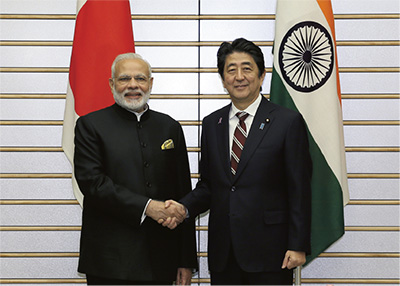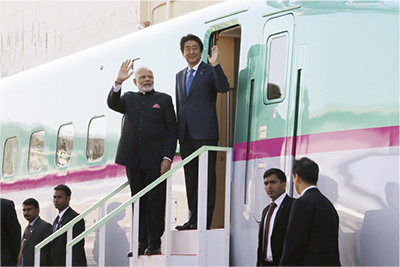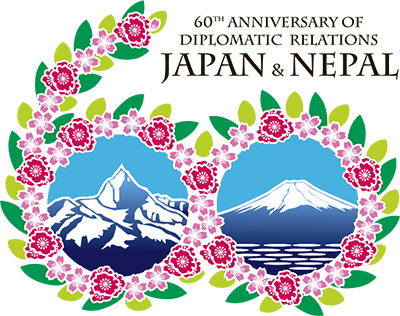Diplomatic Bluebook 2017
Chapter 2
Japan's Foreign Policy that Takes a Panoramic Perspective of the World Map
4.South Asia
(1) India
Geopolitically speaking India is an extremely important country as it faces the Indian Ocean connecting Asia and Africa and is positioned in the center of sea lanes. Moreover, India has the 3rd largest economy in Asia, with the world's 2nd largest population and a huge middle-income group. Japan and India are the two largest democratic countries in Asia, sharing common universal values, such as democracy and the rule of law, as well as strategic interests.
The Indian economy has been maintaining a high economic growth rate of around 7% since Prime Minister Modi took office in May 2014. In addition to the booming stock market, consumption and production have been increasing, and the foreign direct investment emphasized by Prime Minister Modi has also been rising steadily against a backdrop of deregulation.
In diplomatic relations, Prime Minister Modi has put forward the “Act East” policy and is developing active diplomacy that promotes specific cooperation in the Asia-Pacific region, thereby enabling India to gain more influence in the international arena as a global power.
Regarding relations with Japan, in 2016 three summit meetings were held. The highlight was the meeting on the occasion of Prime Minister Modi's visit to Japan in November. In addition to the signing of the Agreement between the Government of Japan and the Government of the Republic of India for Cooperation in the Peaceful Uses of Nuclear Energy, steady progress was made in the high-speed rail project, and great achievements were made in various areas including industrial human resource development, thus substantially advancing the “new era in Japan-India relations”. Furthermore, Prime Minister Abe and Prime Minister Modi shared the view that they would drive peace and prosperity in the Indo-Pacific region and the world by linking the “Free and Open India and Pacific Strategy” and “Act East” policy. During his stay in Japan, Prime Minister Modi made a trip by Shinkansen together with Prime Minister Abe and visited a Shinkansen plant in Kobe.
 Prime Minister Abe shaking hands with Prime Minister Modi of India (November 11, Tokyo; Photo: Cabinet Public Relations Office)
Prime Minister Abe shaking hands with Prime Minister Modi of India (November 11, Tokyo; Photo: Cabinet Public Relations Office) The two leaders visiting a Shinkansen plant (November 12, Kobe City, Hyogo Prefecture; Photo: Cabinet Public Relations Office)
The two leaders visiting a Shinkansen plant (November 12, Kobe City, Hyogo Prefecture; Photo: Cabinet Public Relations Office)(2) Pakistan
Pakistan is located in a strategic location connecting Asia and the Middle East. Thus, its political stability and economic development are essential for the stability and growth of the region. Pakistan is also the most important country in the context of international counterterrorism measures. Furthermore, the country embraces a population of around 190 million, and approximately 60% of the total population is under 25 years old, thus making its economic potential high.
In security, Prime Minister Sharif has identified security improvement as a top priority. Since June 2014 the Pakistani military has conducted operations against armed forces including the Tehrik-i-Taliban Pakistan (TTP), and the number of terrorist incidents was reduced by approximately half in 2015 and by approximately 30% in 2016 compared to the previous year.
In foreign affairs, Prime Minister Sharif has been aiming to improve the relations with neighboring countries including India. In December 2015, the reopening of a full-fledged dialogue was expected when Prime Minister Modi of India paid a surprise visit to Pakistan. However, after the terrorist attack on an Indian Air Force station in January 2016, India-Pakistan relations have been tense. Furthermore, under the “all-weather strategic cooperative partnership,” relations with China have been enhanced in a wide range of fields toward the construction of an economic corridor between China and Pakistan, which is an important constituent element of China's initiative, “One belt, One road.” Regarding the relationship with Afghanistan, the Quadrilateral Coordination Group (QCG: with the participation of Pakistan, Afghanistan, the U.S., and China) has been holding discussions on peace and reconciliation process since January 2016, but the group's consultations have been stalled. Furthermore, there remain many issues between the two countries, including border control, refugee issues, etc.
On the economic front, structural reforms have been completed under the three-year International Monetary Fund (IMF) program implemented from September 2013. Due to this program, macroeconomic indicators have been generally improving, including foreign exchange reserves and a continued growth rate around the 4% mark.
Regarding the relationship with Japan, a summit meeting between Prime Minister Abe and Prime Minister Sharif, and a foreign ministers' meeting between Foreign Minister Kishida and Advisor to the Prime Minister on Foreign Affairs Aziz were held respectively on the occasion of the UN General Assembly in September. With regard to the regional situation, Japan requested at the Summit meeting that the safety of Japanese nationals be ensured and called for improvement of the business environment in view of promoting economic activities.
(3) Bangladesh
Bangladesh, in which Muslims account for around 90% of the population, is a democratic country located in the Bay of Bengal and is geopolitically very important as an intersection between India and ASEAN.
The Awami League administration led by Prime Minister Hasina has been stable. However, following the terrorist incident in October 2015 in which a Japanese national was murdered, attacks on secular bloggers and terrorist incidents targeting Shiite Muslim and Hindu religious facilities and security authorities have continued occurring in 2016. While the Government of Bangladesh had tightened security for foreign nationals through crackdowns on domestic Islamic extremists, a terrorist attack occurred in Dhaka on July 1 (local time), killing more than 20 people including seven Japanese nationals, and an organization calling itself ISIL Bangladesh claimed responsibility for the attack. Subsequently, measures to combat terrorism have been advanced by the security authorities, including exposing Islamic extremist groups and setting up numerous checkpoints but the threat of terrorism still remains throughout the country.
On the economic front, the country, though classified as a least developed country, maintained a steady economic growth rate of around 7.1% in 2016, attributed to robust exports such as textile products. With a population of around 160 million people, Bangladesh is a production base with an abundant, low cost and high-quality labor force and owing to, for example, its considerable infrastructure demand, Bangladesh is attracting attention as a potential market. The number of Japanese-affiliated companies doing business in the country has increased from 61 (2005) to 243 (August 2016). The stable supply of electric power and natural gas, as well as infrastructure development, have also become challenges for foreign companies.
In the relationship with Japan, Prime Minister Hasina visited Japan in May to participate in the outreach meeting for the G7 Ise-Shima Summit and the inauguration ceremony for the new Chancery Building of the Embassy of Bangladesh in Japan. In response to the terrorist attack in Dhaka, Prime Minister Abe and Prime Minister Hasina held a summit meeting on the occasion of the Asia-Europe Meeting (ASEM) Summit (in Mongolia), where the two leaders confirmed cooperation for investigation of the facts of the incident, prevention of recurrence, and thorough measures to ensure the safety of Japanese nationals, and Prime Minister Abe expressed Japan's intention to continue its Official Development Assistance (ODA).
(4) Sri Lanka
Sri Lanka is situated at a strategic point on the sea lanes in the Indian Ocean. The country is traditionally pro-Japanese and its geopolitical and economic importance is attracting attention. After the end of the civil war in 200923, the security situation has greatly improved. Japanese tourists roughly quadrupled as compared with 2008 to about 40,000 (as of 2015).
In domestic affairs, President Sirisena, who took office as a result of the presidential election in January 2015, maintained the grand coalition of the United National Party (UNP) and the Sri Lanka Freedom Party (SLFP) after the general election in August the same year, and is running the government together with Prime Minister Wickremesinghe (UNP).
The new administration set up a National Reconciliation Bureau for national reconciliation, an important task after the end of the civil war, and has been working in a variety of ways including the suggestion of the establishment of a mechanism consisting of a 4-layer system to correspond to the investigation of the truth related to alleged human rights violations, rights for justice, rights for compensation, and prevention of recurrence of conflict.
After the end of the civil war, the economy of Sri Lanka grew at annual rate of 7%, and it continues to maintain an annual growth of 4.8% or above in recent years. Its GDP per-capita was recorded at 3,724 US dollars in 2015. Given the geopolitical importance of the country and its access to the Indian market, an even higher growth is expected.
In the relationship with Japan, following the visit of Prime Minister Wickremesinghe to Japan in October 2015, President Sirisena visited Japan in May 2016 to participate in the outreach meeting for the G7 Ise-Shima Summit and a summit meeting was held with Prime Minister Abe. After the summit meeting, they jointly announced a joint media statement.
- 23 In Sri Lanka, over more than 25 years from 1983 to 2009, the Liberation Tigers of Tamil Eelam (LTTE), an anti-government force of Tamils, ethnic minority living mainly in the north and east of Sri Lanka, fought a civil war against the government, aiming for the separation and independence of their region.
(5) Nepal
Nepal has geopolitical importance as an inland state between the great powers of China and India. For many years, Japan has been a major donor to Nepal and the two countries keep traditionally friendly relations through a variety of exchanges including relations between the imperial family and the former royal family, and mountaineering.
In 2016, Japan and Nepal commemorated the 60th anniversary of the establishment of Japan-Nepal diplomatic relations. Japan and Nepal have maintained friendly relations over a long period of time and they have deepened their bonds as Asian countries that have both experienced a major earthquake, namely the Great East Japan Earthquake (March 2011) and the major Nepal earthquake (April 2015). Throughout 2016, exchange programs in a variety of areas, including arts, culture, sports, tourism, etc., were carried out between the two countries. In September, State Minister for Foreign Affairs Kishi attended the ceremony for the 60th anniversary of the establishment of diplomatic relations between Japan and Nepal as the representative of Japan. The ceremony was held with great success with the presence of related ministers from the Nepali side led by Prime Minister Dahal (Prachanda), government officials from the two countries, diplomatic missions in Nepal, staff of international organizations, etc. Japan and Nepal stated that they would further strengthen the friendly and cooperative relations between the two countries.
In domestic affairs, following the big earthquake in April 2015, the enactment of a new constitution became a critical issue in the context of recovery and reconstruction from the earthquake, and the new constitution was promulgated in September the same year. In October the following year, the new Oli administration took office but subsequently due to confrontations between the ruling and opposition parties, Prime Minister Oli announced his resignation in July 2016. In August, Chairman of the Communist Party of Nepal-Maoist Centre (CPN-MC) Dahal (Prachanda) was elected as the prime minister and a new administration started. Important issues for the new Dahal administration include the steady implementation of the new constitution, the acceleration of reconstruction and infrastructure development.
In regards to the relationship with Japan after March 2015, the Second Japan-Nepal Political Dialogue between the Ministries of Foreign Affairs was held in Nepal in June 2016 to conduct exchanges of views regarding issues such as the initiatives for the 60th anniversary of the establishment of diplomatic relations, the assistance from Japan for the reconstruction of Nepal after the earthquake, and the regional situation. Bilateral cooperation including political affairs has been further expanding throughout the anniversary year and towards the next 60 years.
 Official logo for the 60th anniversary of the establishment of Japan-Nepal diplomatic relations in 2016
Official logo for the 60th anniversary of the establishment of Japan-Nepal diplomatic relations in 2016 Official logo for the 30th anniversary of the establishment of Japan-Bhutan diplomatic relations in 2016
Official logo for the 30th anniversary of the establishment of Japan-Bhutan diplomatic relations in 2016(6) Bhutan
Bhutan peacefully shifted from a monarchy to a constitutional monarchy in 2008. Currently, efforts are being made to establish a democracy under the Tobgay administration. The government sets Gross National Happiness (GNH) as a guideline of the administration and is particularly working on economic independence, food production, and the reduction of youth unemployment rate under the 11th Five-Year Plan (until 2018).
With regard to the relationship with Japan, since His Majesty and Her Majesty of Bhutan visited Japan as state guests in 2011, exchanges between Japan and Bhutan have become active in a variety of fields and at various levels. In January 2016, Economic Minister Wangchuk visited Japan and had a meeting with State Minister for Foreign Affairs Kihara to exchange views to further encourage economic relations between the two countries, including increasing the number of Japanese tourists to Bhutan and investment from Japanese companies in Bhutan. Furthermore, 2016 was the 30th anniversary of the establishment of Japan-Bhutan diplomatic relations. In May in Japan, the inauguration ceremony of the Bhutan Exhibition in Ueno Royal Museum was held with the presence of Her Majesty the Queen Mother Tshering Yangdon Wangchuck and Her Royal Highness Princess Dechen Yangzom Wangchuck. Furthermore, Special Advisor to the Prime Minister Katsuyuki Kawai attended the inauguration of “Japan Week in Bhutan” held in Bhutan in September.
In the area of economic cooperation, the two countries exchanged letters in October for grant aid of a maximum of 251 million yen for providing cultivators to encourage agricultural mechanization and grant aid of a maximum of 2.156 billion yen to reconstruct bridges on National Highway 4, a major road network in Bhutan, in December, etc.
(7) The Maldives
The Maldives is an island country in the Indian Ocean and its economic growth is mainly led by fishing and tourism, which accounts for about 30% of GDP. The country graduated from a least developed country in 2011, and its per-capita GDP reached approximately 8,395.8 US dollars (as of 2015).
With regard to domestic affairs, movements against President Yameen have been observed. For example, the former president Nasheed was given asylum while he was staying in the United Kingdom in May and the Maldives United Opposition (MUO) was launched in London (UK) in June. Furthermore, regarding foreign policy, the country declared withdrawal from the British Commonwealth of Nations in October.
Regarding the relationship with Japan, momentum to further deepen bilateral ties is growing with the opening of the Embassy of Japan in the Maldives in January 2016 and toward the 50th anniversary of the establishment of diplomatic relations in 2017. In the area of economic cooperation, cooperation for the development of a terrestrial digital broadcasting network based on the Japanese standard is under way. The number of mutual visits is also increasing. In February 2016, Parliamentary Vice-Minister for Foreign Affairs Masakazu Hamachi visited the country to attend the opening ceremony of the Embassy of Japan in the Maldives, followed by a visit to Japan made by the Speaker of the People's Majlis Maseeh to participate in the Global Conference of Parliamentarians on Population and Development in April. In October, Minister of Youth and Sports Adam visited Japan to participate in the World Forum on Sport and Culture.
